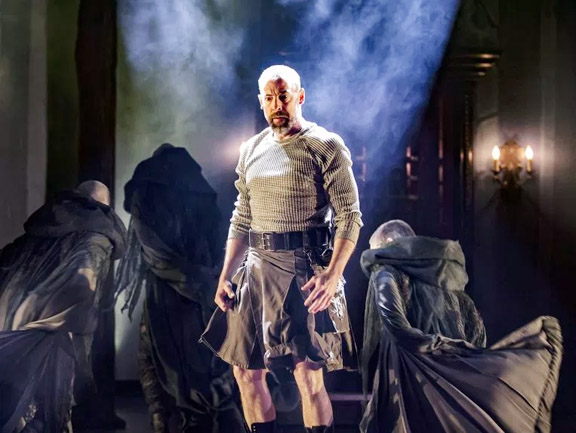Chicago Shakespeare’s previous full staging of Macbeth back in January of 2009 was set in a warzone. The characters donned combat fatigues and crew cuts (I never could quite distinguish one character from another), and in one scene music blared as Mike Nusbuum c-sectioned a baby boy from a woman’s body. It was memorable and ambitious, but not particularly fun.
In comparison, the company’s newest Macbeth is set in a virtual magic forest, where the whims of men and women are controlled as much by their surroundings as by free will. Directed by Aaron Posner and Teller, this production does not contain the sheer number of illusions that were seen in The Tempest (their 2015 collaboration), but they still manage to make this tragedy more magical than horrific—a fitting interpretation for Shakespeare’s bloodiest play.

As the lead, Ian Merrill Peakes emphasizes Macbeth’s more sympathetic traits. He is driven by his own greed but also by an overwhelming sense of inertia. Consider that he arrives outside King’s Duncan’s door without the knife needed to slay his king and houseguest, but the weapon materializes before him in the mirror as he examines his own face. Darker interpretations of Macbeth push the protagonist into the role of irredeemable monster more quickly—after all, he does order the deaths of his best friend Banquo (Andrew White) and Banquo’s son (Austin Molinaro) early in the third act. I prefer Peakes’ interpretation because he keeps the audience invested in Macbeth’s future until the end. We can even muster some sympathy for Macbeth when he throws down his sword and suicide charges at Macduff (Timothy D. Stickney), for this Macbeth has accepted the consequences for breaking moral boundaries to gain power.

Chaon Cross steals every scene as Lady Macbeth with her acting and with her wardrobe (designed by Mara Blumefield). She begins in a form-fitting black gown, which helps her remain inconspicuous during her early scheming. Once she has taken the role of implicit murderer, Lady Macbeth wears a series of striking red dresses: the red hides the blood on her hands after Duncan’s death, and it keeps all eyes on her while her husband is seeing ghosts during the climactic banquet scene. Finally, in her madness speech, Cross performs some magic as blood appears on her hands and multiplies until her arms are covered and her stark white nightgown has been stained (“Here’s the smell of blood still: all the perfumes of Arabia will not sweeten this little hand.”).

A production with so much emphasize on magic leads to high expectations regarding Posner and Teller’s concept for the three weird sisters (McKinley Carter, Theo Germaine, and Emily Ann Nichelson)—they who prophesize while adding snake and newt and tongue of dog to a boiling cauldron. The characters only have lines in four scenes, but in this version they are on stage for most of play, and they hold a supernatural power over Scotland that far exceeds the blood lines of royalty. Just as Dr. T. J. Eckleburg looks down upon The Great Gatsby’s Valley of Ashes, these weird sisters look down from a balcony—sometimes humming, sometimes hissing, always watching—as the players beneath betray and murder.
While I celebrate Shakespeare’s entire catalog, Macbeth has never been in my upper tier of the Bard’s works—perhaps because so much of the dialogue is devoted to military strategy as opposed to deep relationships. Yet, this production makes a convincing case for why Macbeth remains one of Shakespeare’s most cherished plays. The visuals are stunning, but more importantly the emphasis on the mystic qualities of the setting adds new light to characters who are often presented without enough soul.
